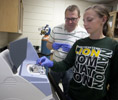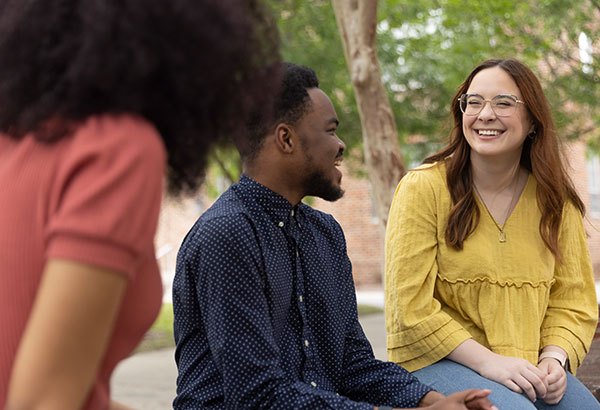Southeastern grad student combines love of horses with award-winning research
Tuesday, March 28, 2017 
by: Rene Abadie
CHECKING SAMPLES – Southeastern Louisiana University graduate student Kalie Beckers of Loranger runs collected samples on the university’s personal genome machine that generates millions of DNA-sequences from samples under the supervision of research associate Christopher J. Schultz. Beckers, who plans on going into veternary science studies in the fall, was recognized for her work by the South Central Branch of the American Society of Microbiology.
HAMMOND – Kalie Beckers of Loranger loves horses. She also loves her academic field
of biology and has found a way to combine the two interests into award-winning research.
Beckers, a graduate student in biological sciences at Southeastern Louisiana
University, has received the R.J. Strawinski Memorial Research Award presented by
the South Central Branch of the American Society of Microbiology. The award is presented
by the organization in recognition of outstanding presentations by graduate students.
The branch is comprised of more than 1,000 microbiologists from over 50 institutions
in Arkansas, Louisiana and Mississippi.
Beckers’ award recognized her efforts to develop a solid methodology to collect
fecal samples from horses and related species so that wider and more consistent research
can be conducted.
“Kalie has accomplished a lot in a short period of time. She proves it helps
to work on projects that you love,” said Southeastern Biological Sciences Professor
Gary Childers, who supervised her work.
“We were looking for a standard method to collect samples so that potentially
I can crowdsource,” said Beckers, who will enter veterinary school in the fall. “Crowdsourcing
allows scientists to obtain additional information through the enlistment of services
by a wide group of people. With more samples from a wider geographical range, I will
be able to research many more hypotheses and not be limited by samples only in one
area.”
She said her initial work was to develop a standard method of collection to ensure
samples are not contaminated and are properly handled to get informative results.
“Kalie’s study demonstrates that contaminants can very quickly grow and confound
results, but also finds that compromised samples can likely be identified and removed,”
said Christopher J. Schultz, a Southeastern biology research associate. He said her
project has taken lessons learned from the American Gut Project, a crowd-sourced,
citizen-scientist effort that collects and shares data and applies the information
to horse studies.
“I love horses and work with them all the time at home. I wanted to research
something I was interested in while working in Dr. Childers’ lab,” she said. “He studies
bacteria, so we met in the middle – horses and their intestinal bacteria.”






